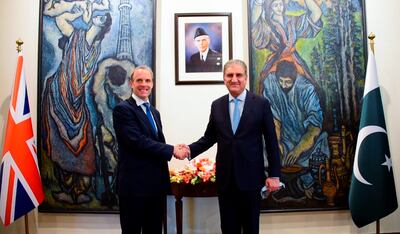Pakistan could face an internal revolt if the crisis in Afghanistan spills over the border, a former leading UK official has said.
Mark Sedwill said Pakistan’s military chiefs needed to focus more on internal security rather than concentrating on their rival India.
The Taliban victory in Afghanistan has led to concerns over militant attacks in the border region with Pakistan.
Taliban fighters have long crossed the border between the two countries. The US has long suspected Pakistan’s government of having links to the Taliban, an accusation denied by Islamabad.
Mr Sedwill, the former head of Britain's Civil Service and previously ambassador to Kabul, said Pakistani leaders had misjudged their interests in Afghanistan.
He highlighted the risk along the border between Pakistan and Afghanistan, the heartland of the Pashtun ethnic group.
“The risks of a spillback into Pakistan of a Taliban-ised Pashtun belt – and of course that border runs right down the middle of it – are acute,” he told a Policy Exchange event.
“For some reason, they always concluded that they could somehow keep a lid on that, and that a Taliban-ised, radicalised or unstable Afghanistan was one that might be aligned with India.
“Pakistani military chiefs tend to focus all of their attention on India, but they do need to focus their attention on internal security as well.”
The UK announced £30 million ($41.48m) in aid to Afghanistan's neighbours to support Afghan refugees on Friday as Foreign Secretary Dominic Raab visited Islamabad.

“It is vital that we help those fleeing Afghanistan and do not allow the crisis there to undermine regional stability," said Mr Raab.
“That’s why these life-saving supplies are so important. They will provide Afghans who have left everything behind with essential kit offering shelter and basic sanitation as they seek to pick up the pieces of their lives. This aid demonstrates the UK’s commitment to shoulder our humanitarian responsibility and support those countries who will face the greatest demands for those displaced.”
The £30m is the first chunk of the £286m in aid that the UK has pledged to Afghanistan this year. World powers regard Pakistan as critical to Afghanistan’s future as they try to prevent a flow of refugees and extract people left behind by the Kabul airlift.
More than 1.4 million people already live in Pakistan after fleeing Afghanistan, the UN’s refugee agency UNHCR says.
Pakistani Prime Minister Imran Khan has described a stable Afghanistan as “vitally important” for the region.
Pakistani officials are concerned about attacks by a separate Taliban group in the country, while there are also fears of further attacks by ISIS-K, an affiliate of ISIS in Syria and Iraq.
The country’s envoy to the UN, Munir Akram, said last month that Pakistan would not allow its territory to be used to destabilise Afghanistan.
But HR McMaster, a former US national security adviser under Donald Trump, said world powers should apply pressure on Pakistan to do more on terrorism.
“Pakistan has been acting as an enemy nation against us, by organising training and equipping these forces,” he told the Policy Exchange event.
“They ought to be forced to make a choice – to go after these groups less selectively, or to suffer economic and diplomatic isolation.
“I think they should be on a path, based on their behaviour, to be a pariah state with a single state sponsor – China. You know what that looks like to me? That looks like North Korea. Is that what they want their future to be?”

Mr Sedwill said the security threat extended beyond Pakistan as the Taliban victory inspires extremists elsewhere to take up arms.
He said the “inspirational effect” of the insurgents' triumph had reversed some of the gains brought about by the defeat of ISIS in Iraq and Syria.
“The Taliban’s victory in Afghanistan will undoubtedly fuel extremism and terrorism worldwide, whether or not it is directed from there,” he said. “The security threats have undoubtedly gone up.”
US President Joe Biden has said that the Pentagon will carry out counterterrorism operations from outside Afghanistan if necessary.
Western powers hope to persuade the Taliban to combat terrorism by applying leverage via international pressure and frozen bank accounts.
But Mr McMaster said it was a delusion to think that the Taliban could be persuaded to moderate their rule over Afghanistan.
“Let’s stop pretending that we can partner with the Taliban,” he said. “Let’s stop pretending that this Taliban, they’re going to be more benign.
“What is the more benign Taliban? Is that mass executions every other Saturday in the soccer stadium? Is that every other girls’ school bulldozed?”


